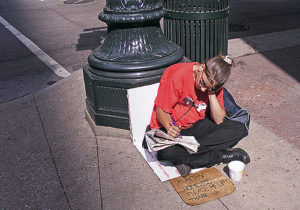The Cook County Commission on Social Innovation was pioneered in an effort to reduce the burgeoning effects of poverty in Chicago and the surrounding neighborhoods. With a goal of total transformation, it hopes to provide a model for other cities working towards sustainable poverty reduction. This multifaceted approach focuses on catalyzing social innovation through organizations rooted in the market, that use market-based incentives. The Commission is facilitating enterprise and economic development in an area with substantial need for reform.
Cook County is the second most populous county in the United States. It is home to 5.2 million people, 17% of which are living below the national poverty line. A variety of social issues are symptomatic of cities with inflated poverty levels and stagnant, or underdeveloped economies. High degree of unemployment, inadequate access to healthcare and education, food insecurity, and high violent crime rates to name a few. Combating these social ills is a daunting task for an overworked and underfunded social and non-profit sector. The Commission on Social Innovation is being spearhead by Jesus Garcia, former mayoral candidate, and Marc J. Lane, a Chicago based lawyer, who now hold the positions of chair and vice chair respectively.
Lane drafted an Illinois law that allowed for the creation of low profit limited liability companies (L3C’s) in the state. The law, he says,
May facilitate program-related investments and engage diverse stakeholders around a clear and unambiguous ordering of statutorily imposed charitable or educational priorities that can’t be waived or negotiated away.
L3C’s have received broad support. “[They are] the only business form in the United States that permanently and irrevocably places mission above all other objectives,” he explains. The intention is to encourage a focus on job creation, community revitalization, workforce development and entrepreneurship. In this way the commission hopes to support innovative approaches to social development through alternative means.
Social enterprise, or impact entrepreneurship is a core component enlisted by Cook County. This business model is an innovative approach to poverty reduction, and has become a rising solution to effective social change. It is a market-based initiative that incentivizes poverty reduction strategies with both financial and social returns. Take Cleanslate. The organization provides the county with a vital for-profit service with concurrent social gains. The roadway cleaning company employs economically marginalized individuals, not only providing meaningful employment, but also valuable work-skills training. This triple bottom line executes the mission of social enterprise perfectly. It provides a community service of neighbourhood maintenance, job creation and skills development, while also being a self-sustaining for-profit business.
The Cook County Commission is a brilliant example of how innovation in the business world can lead not only to economic development, but equality and poverty reduction too. The long-term goals this task force hopes to enable are truly inspiring. Promoting economic and social development through business is a sustainable poverty reduction strategy. Hopefully tackling social challenges in Cook County through the Commission on Social Innovation will inspire similar models in other difficult areas across the country.
SEE Change ‘s Canadian intern, Samantha Scalise, is a recent graduate of McGill University’s international development program. Focusing on culture and society she hopes to use her degree to promote positive social change locally and globally.




Have you looked at the latest model of social enterprise, FairShares? http://www.fairshares.coop